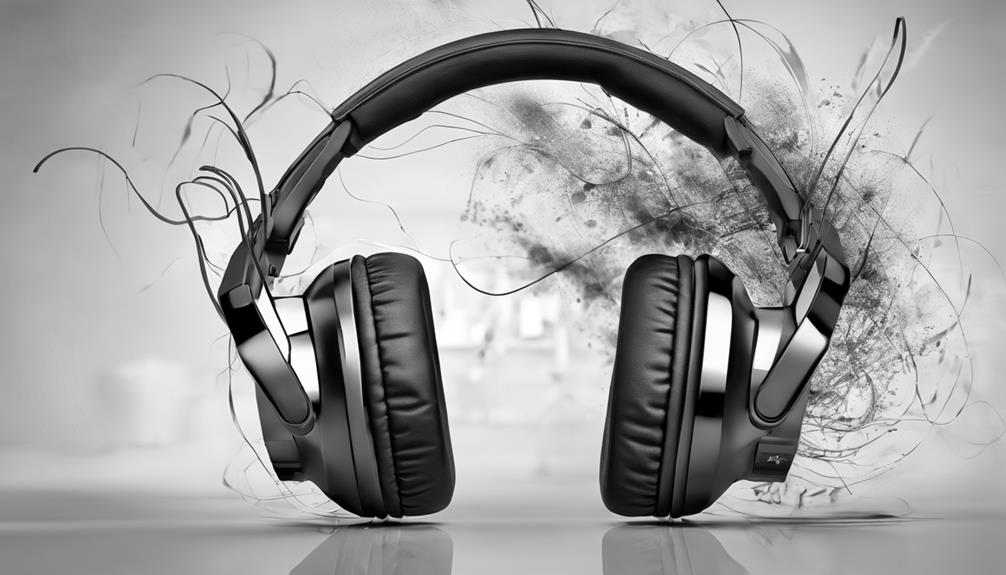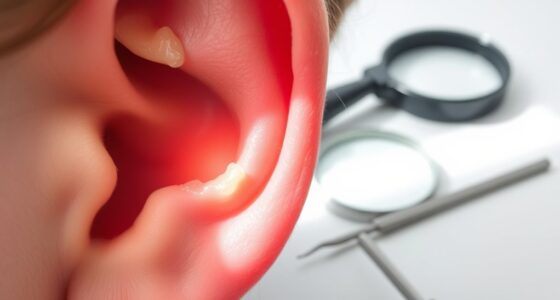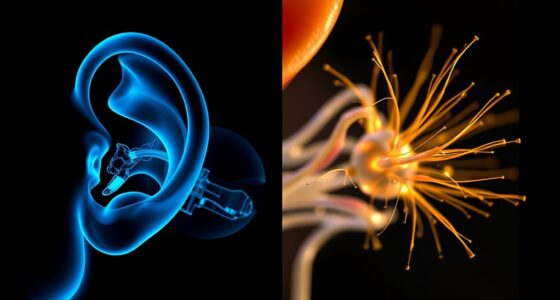Dealing with sinus pressure is definitely not fun. However, what many people may not realize is that it could be linked to hearing loss. The intricate connection between our sinuses and ears can result in unexpected consequences.
Understanding how sinus pressure can impact our hearing is crucial, and in this guide, we'll unravel the mysteries behind this phenomenon.
So, how exactly does sinus pressure lead to hearing loss, and what steps can be taken to address this issue?
Key Takeaways
- Sinus pressure impacts Eustachian tubes, leading to ear pain.
- Blocked tubes from sinusitis can cause temporary hearing loss.
- Prompt medical attention is crucial for addressing sinus-related hearing issues.
- Restoring Eustachian tube function is vital in managing sinus pressure-related hearing problems.
Understanding Sinus Pressure and Hearing Loss
Understanding the connection between sinus pressure and hearing loss is crucial for recognizing and addressing potential issues that may arise. Sinus pressure can impact our hearing through the Eustachian tubes, which link the sinuses to the ears. When these tubes become blocked due to conditions like sinusitis, it can lead to symptoms such as ear pain, pressure, and even partial hearing loss. The increased pressure in the sinuses can affect the functioning of the Eustachian tubes, causing a sensation of sounds being muffled or underwater.
In cases of sinus infection, temporary hearing loss can occur as the compromised ear function struggles to transmit sounds effectively. By understanding how sinus pressure can influence the ears, individuals can be more aware of the potential causes behind their hearing difficulties. Prompt medical attention from ENT specialists is essential to address sinus pressure effectively and mitigate any associated hearing issues.
Impact of Sinus Pressure on Ears

When sinus pressure affects the ears, it can lead to various symptoms such as ear pain, pressure, and temporary hearing loss due to the inflammation and blockage of the Eustachian tube. The impact of sinus pressure on the ears can be distressing and disruptive to daily life.
Here are some key points to consider:
- Eustachian Tube Blockage: Sinus pressure can cause inflammation in the sinuses, leading to the blockage of the Eustachian tubes, which are responsible for equalizing pressure in the inner ear.
- Temporary Hearing Loss: The blockage of the Eustachian tubes can result in temporary hearing loss as sound waves struggle to pass through the affected ear.
- Ear Pain: Sinus pressure can manifest as ear pain, ranging from a dull ache to sharp, stabbing sensations, affecting the overall comfort and well-being of an individual.
If you experience these symptoms, seeking advice from a healthcare professional is crucial to address the underlying sinus issues and prevent further complications.
Connection Between Sinusitis and Hearing Loss
Upon experiencing sinusitis, individuals may notice a direct correlation between the condition and potential hearing loss attributed to Eustachian tube dysfunction. Inflamed sinuses, a common symptom of sinusitis, can lead to increased sinus pressure, affecting the Eustachian tube's ability to regulate air pressure in the middle ear. This can result in blockages within the Eustachian tube, hindering sound transmission and causing ear pain or discomfort. When the Eustachian tube is unable to function correctly due to sinusitis, it can lead to temporary hearing loss or a sensation of muffled sounds.
Individuals suffering from sinus infections may experience symptoms such as earache, pressure in the ears, and impaired hearing due to the impact on the Eustachian tube. Understanding the connection between sinusitis and hearing loss underscores the importance of managing sinus pressure promptly to alleviate potential issues with hearing. By addressing sinusitis symptoms early on and seeking appropriate treatment, individuals can help prevent or minimize any hearing-related complications associated with Eustachian tube dysfunction caused by inflamed sinuses.
Managing Sinus Pressure-Related Hearing Issues

Experiencing sinus pressure-related hearing issues can be concerning, but there are effective management strategies that can help alleviate symptoms and prevent potential complications. When dealing with inflamed sinuses causing ear pain and potential hearing loss, it's essential to consider various approaches to manage the discomfort and restore auditory function. Here are some key management strategies to address sinus pressure-related hearing problems:
- Utilize Nasal Sprays: Nasal sprays can help reduce inflammation in the nasal passages and Eustachian tubes, allowing for better airflow and relieving pressure on the ears.
- Apply Warm Compress: Applying a warm compress to the face can help soothe sinus pain and promote drainage, potentially easing the pressure on the ears.
- Consult an ENT Specialist: Seeking guidance from an Ear, Nose, and Throat (ENT) specialist can provide personalized treatment options and ensure proper care for sinusitis-related hearing issues.
Tips for Alleviating Sinus-Related Hearing Loss
To alleviate sinus-related hearing loss, consider incorporating nasal sprays and warm compresses into your daily routine to help relieve pressure in the ears. Sinus pressure can disrupt the Eustachian tube function, leading to symptoms like ear fullness, decreased hearing, and muffled sounds.
Using nasal sprays can help reduce inflammation in the sinuses, allowing for better Eustachian tube ventilation. Additionally, warm compresses can aid in opening up the nasal passages, relieving pressure in the ears.
For more severe cases of sinus-related hearing loss, sinus irrigation may be recommended to clear out the sinuses effectively. It's crucial to address underlying sinusitis with appropriate medications prescribed by a healthcare professional.
Seeking guidance from an ENT specialist can ensure a proper diagnosis and tailored treatment plan to manage sinus-related hearing issues efficiently. By keeping the sinuses clear and reducing inflammation, you can help restore normal Eustachian tube function and improve your hearing.
Frequently Asked Questions
Can Sinus Pressure Cause Hearing Loss?
Yes, sinus pressure can cause hearing loss. When sinuses are blocked, the Eustachian tube can be affected, leading to temporary hearing issues.
This may make sounds seem muffled or underwater. Seeking prompt treatment for sinusitis can help alleviate these symptoms and prevent potential hearing problems.
It's essential to manage sinus pressure effectively through a combination of medical guidance and home remedies to maintain optimal ear health.
How Do You Drain Sinus Fluid From Your Ear?
When dealing with sinus fluid buildup in the ear, we can employ simple techniques to encourage drainage. Methods like the Valsalva maneuver, yawning, or swallowing can help open the Eustachian tube.
Tilt your head to the side or use warm compresses to assist the natural drainage process. Additionally, nasal decongestants or saline sprays may aid in reducing congestion.
What Is a Sinus Pressure in the Ear?
Sinus pressure in the ear is often caused by inflammation and swelling in the sinuses that affects the Eustachian tube. This can result in ear pain, pressure, and a feeling of fullness.
Temporary hearing loss or muffled sounds may occur due to blocked Eustachian tubes. The discomfort can worsen when bending over or lying down.
Managing sinus pressure can help relieve ear symptoms and prevent potential hearing issues.
How Do You Unclog Your Ears From Sinus Pressure?
When dealing with clogged ears from sinus pressure, we can find relief through various methods. Trying the Valsalva maneuver, chewing gum, or using a warm compress can help equalize pressure and alleviate discomfort.
Nasal decongestants or saline sprays may reduce swelling, while staying hydrated promotes sinus drainage. By incorporating these strategies, we can effectively address ear congestion caused by sinus pressure and improve our overall comfort and well-being.
Conclusion
In conclusion, sinus pressure can indeed impact our hearing, causing discomfort and potential temporary hearing loss. It's important to seek prompt treatment and utilize remedies to alleviate symptoms and prevent further complications.
Did you know that over 30 million Americans suffer from sinus infections each year, leading to potential hearing issues? By staying informed and proactive, we can better manage sinus pressure-related hearing problems and maintain our overall well-being.










